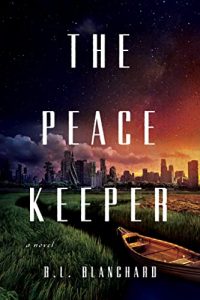Authors Interviewing Characters: B.L. Blanchard interviews Chibenashi
THE PEACEKEEPER
 Against the backdrop of a never-colonized North America, a broken Ojibwe detective embarks on an emotional and twisting journey toward solving two murders, rediscovering family, and finding himself.
Against the backdrop of a never-colonized North America, a broken Ojibwe detective embarks on an emotional and twisting journey toward solving two murders, rediscovering family, and finding himself.
North America was never colonized. The United States and Canada don’t exist. The Great Lakes are surrounded by an independent Ojibwe nation. And in the village of Baawitigong, a Peacekeeper confronts his devastating past.
Twenty years ago to the day, Chibenashi’s mother was murdered and his father confessed. Ever since, caring for his still-traumatized younger sister has been Chibenashi’s privilege and penance. Now, on the same night of the Manoomin harvest, another woman is slain. His mother’s best friend. The leads to a seemingly impossible connection take Chibenashi far from the only world he’s ever known.
The major city of Shikaakwa is home to the victim’s cruelly estranged family—and to two people Chibenashi never wanted to see again: his imprisoned father and the lover who broke his heart. As the questions mount, the answers will change his and his sister’s lives forever. Because Chibenashi is about to discover that everything about those lives has been a lie.
Conversation with Chibenashi:
BLB: Tell me a little bit about yourself
C: There’s not much to tell. I have a sister, Ashwiyaa, who’s five years younger than me. We went through something pretty rough 20 years ago, when we lost both of our parents. So I take care of her. I’m also a Peacekeeper in our small village of Baawitigong—one of three in the whole village. It’s a peaceful life, I guess.
BLB: You and your sister are both in your thirties now. What sort of care does your sister need?
C: What happened with our parents… it was hard for her. She’s still pretty traumatized. Anxious. Afraid. But with me, she feels safe.
BLB: Do you have any help?
C: We have the free medical care that everyone gets, and I’m lucky that a good friend is the village Healer. And my mother’s best friend, Meoquanee, helps me out a lot. The rest of the community was also a big part of our lives back when it happened, but Ashwiyaa didn’t react well to so many people around. She begged me to keep them away. So I did. People didn’t like it but they respected it. Ashwiyaa was okay with Meoquanee. It’s like having our mother back. It was just us and Meoquanee after that. And it probably always will be.
Q: Tell me about your work as a Peacekeeper.
C: There isn’t much in the way of crime here in Baawitigong, which is a blessing. Much of the village is communal—the farmlands, the property, the fires. When you have a strong community, there isn’t much crime, because you’re so closely tied to everyone, even if you’re on the fringe of it like we are. If you hurt someone, you hurt someone close to you, and by hurting them, you’re hurting yourself. We do have a lot of tourists who visit the village, and so any crime that does happen usually involves them. But even that is pretty rare. Mostly my job is to help people find lost property.
BLB: You’ve lived in Baawitigong your whole life, and it’s very small. And it must be wonderful to live on the same land as your ancestors. But have you ever wanted to go further afield—say, to a big city like Shikaakwa, where a lot of people from Baawitigong have moved?
C: (long pause) I guess we all imagine living different lives from time to time. But Ashwiyaa wouldn’t do well anywhere else.
BLB: You sound very devoted to your sister.
C: She’s the most important person in my life.
BLB: Can you tell me a bit more about what happened to your parents?
C: (shifting uncomfortably) I’d really rather not.
BLB: Why not?
C: It serves no purpose. They’re gone. The twentieth anniversary of it happening is coming up, and it always falls on the night of the Manoomin harvest, which used to be my favorite night of the year. What happened to them… it took away so much. Getting through it is hard enough, and everyone always wants to talk to me about it. I said everything I needed to say at the time. More words won’t make things better.
BLB: Fair enough. As the family of a victim of a crime, the focus of the justice system is intended to make you whole again. Did it succeed?
C: I don’t think there’s anything that could be done that could ever truly make you whole again after that.
BLB: You say that your father being locked away for killing your mother didn’t make you feel whole again. What does it make you feel?
C: (standing up) I think I’m done here.
Category: Interviews, On Writing

























